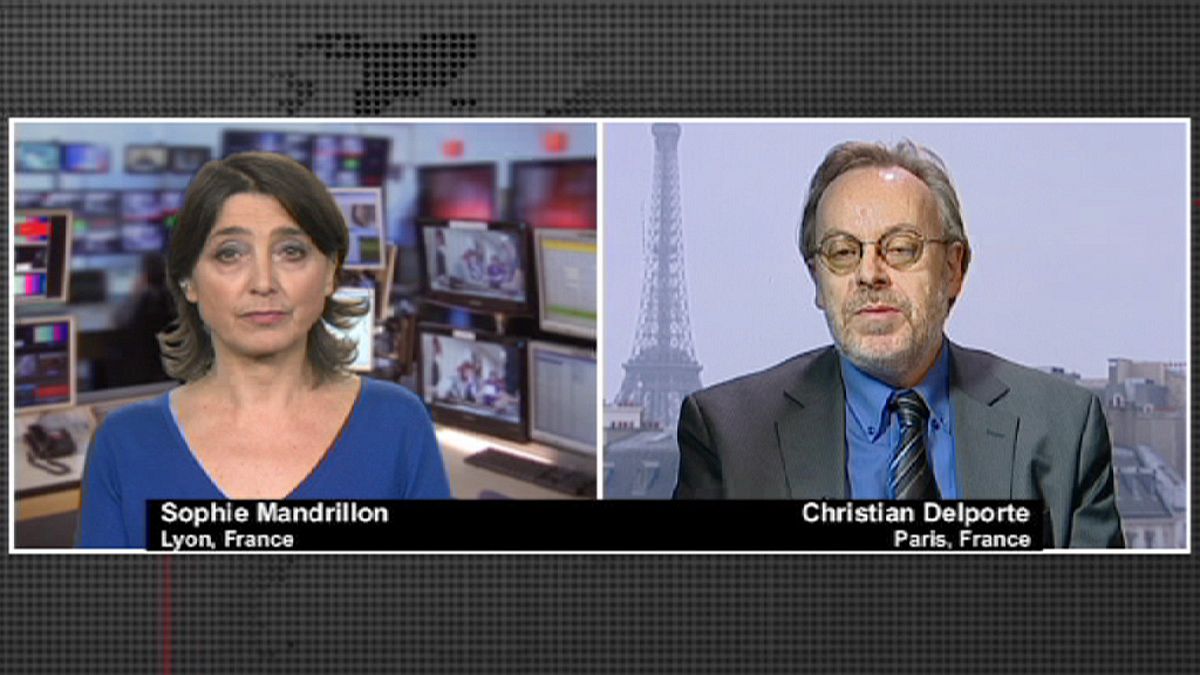A single showcase debate on television between the contenders for the French presidency was intended to convince people who had not yet made their choice of candidate, and to reassure supporters. The Socialist François Hollande and the UMP conservative incumbent Nicolas Sarkozy each tried to catch the other out.
Early on, Sarkozy said: “That’s a lie.”
Hollande asked: “What?”
Sarkozy: “You saying I’m always satisfied and don’t shoulder responsibility. That’s a lie.”
Hollande: “Then you’re not at all pleased with yourself, I must have made a mistake, I do apologise: you’re very displeased with yourself.”
Sarkozy: “This isn’t a joke contest, Mr Hollande.”
The French presidential election debate tradition was inaugurated more than three decades ago, in 1974, by the candidates François Mitterrand and Valery Giscard d’Estaing. The former vaunted the caring nature of his Socialist Party, and it backfired.
Giscard said: “You don’t have a monopoly on ‘heart’, Mr. Mitterrand. I have a heart, like yours, which beats in its own way; and it’s mine. Don’t talk to the French people in that way that is so hurtful to others.”
By 1988, President Mitterrand, who followed Giscard, was governing with the conservatives in what is known as cohabitation. He found himself competing with his prime minister, a young Jacques Chirac, to whom he delivered a now famous putdown.
Chirac said: “Permit me just say to you that this evening I am not the Prime Minister and you are not the President of the Republic; we are two candidates on an equal footing, who are submitting to the French people’s judgement – those who count. You will permit me, therefore, to call you Mr Mitterrand.”
Mitterrand said: “You are quite right, Mr Prime Minister.”
The debate tradition was only put on ice during the 2002 contest when Chirac, by now the incumbent, refused to hold one with the far right candidate Jean-Marie Le Pen. It was picked up again in 2007, with the novelty of a woman contender, the Socialists’ Ségolène Royal, against Nicolas Sarkozy, who baited his opponent.
Sarkozy: “I don’t know why Ms Royal is getting annoyed.”
Royal: “I’m not getting annoyed, I’m angry.”
Sarkozy: “It must be something when you get annoyed then.”
Royal: “I’m never annoyed. I keep my cool.”
Sarkozy: “Listen, you’ve just lost it.”
It was not about logic, it was about scoring points. Royal held her head high, but she lost the race to him.
Twenty million people are estimated to have watched the Sarkozy-Hollande TV debate. There was only one, between the first round of polling and the run-off. So it was a highlight. To talk about whether it might have influenced any voters, we spoke with Christian Delporte, a specialist in media and political communication.
Euronews journalist Sophie Mandrillon said: “This televised debate was obviously an event. It comes in a particular context: on the right an outgoing president who is predicted to lose, and on the left a favourite with little experience at this level of power. Did yesterday evening really produce a winner?”
Christian Delporte: “We had a favourite in opinion polls: Hollande, but we also had a debating favourite: Sarkozy. The stakes for Hollande were to show he has the qualities of a president. The stakes for Sarkozy were to show his adversary François Hollande’s experience isn’t deep. We expected a feisty Sarkozy, and we got one. I don’t believe we were expecting the fighting spirit we got out of Hollande. I think he surprised us. I also think what was the most important part in the long-drawn-out debate – three hours – was the first ten minutes. Each one tried to get the upper hand. Sarkozy tried to steer the debate but Hollande immediately put him in his place. We’re hearing today it was sort of a draw, but it does give at least a point to François Hollande.”
euronews: “How did you find them? Where were they stronger or weaker?”
Delporte: “I think Hollande was good with his come-backs, good in the exchanges, I don’t think he was completely thrown by his adversary, except maybe on immigration. I think one of the errors Sarkozy made was to fire off both barrels about his track record instead of talking about the future.”
euronews: “Part of this ritual of the televised duel lies in the small phrases and taunts. What were the key moments in this debate?”
Delporte: “There weren’t a lot of pat phrases, although Hollande did carry it off telling Sarkozy: ‘You’re always self-satisfied.’ I think we’re going to see that more or less everywhere.”
euronews: “There are a lot of undecided voters, say 20 percent, who choose their candidate at the last minute. Do you think yesterday’s duel will influence the final result?”
Delporte: “Well, 20 percent of undecideds a few days from the presidential run-off isn’t huge. In 2007, it was closer to 30 or 40. That said, the lesson we’ve learned from debates in the past is that undecideds don’t all swing into one camp or the other, they go to both candidates. We also know from experience that opinion polls about the debate always give the advantage to the presidential frontrunner.”
euronews: “Three hours face-to-face is a ritual that hasn’t really changed since 1974. Hasn’t this format had its day? With the energy given to the shock phrase, is there still room in there to give the voters real information?”
Delporte: “I don’t think that proposals are the most important thing in this type of debate. What we look for in them is, first of all, the clash of personalities, and from this point of view we were well served yesterday evening.”
